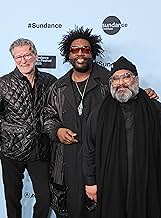Sly Lives! (aka the Burden of Black Genius)
- 2025
- 1h 52m
IMDb RATING
7.6/10
1.2K
YOUR RATING
It focuses on the life and legacy of Sly and the Family Stone, telling the story behind the rise, reign and fadeout of one of pop music's most influential artists.It focuses on the life and legacy of Sly and the Family Stone, telling the story behind the rise, reign and fadeout of one of pop music's most influential artists.It focuses on the life and legacy of Sly and the Family Stone, telling the story behind the rise, reign and fadeout of one of pop music's most influential artists.
- Nominated for 1 Primetime Emmy
- 4 nominations total
Sly Stone
- Self - Singer, Sly & The Family Stone
- (archive footage)
Cynthia Robinson
- Self - Trumpet, Sly & The Family Stone
- (archive footage)
Featured reviews
As "Sly Lives! (aka the Burden of Black Genius)" (2025 release; 112 min) opens, talking heads are gushing about how revolutionary Sly & the Family Stone was (multi-racial! Multi-gendered! Irresistible music!). The film's director then asks prominent Black artists what they think about the burden of Black genius. We then go to "San Francisco 1964", where Sly is a well-known and beloved DJ. At this point we are 10 minutes into the documentary.
Couple of comments: this is the second documentary from musician Questlove, whose first documentary "Summer pf Love" won the Oscar for best documentary. Here the Roots drummer assesses the life and times of Sly Stone, who in the late 60s shot out of nowhere like a comet to the very top of the music world and stayed there for a couple of years, only then to fade away rather quickly. (Sly & the Family Stone also feature prominently in the "Summer of Soul" documentary.) One of THE highlights for me was to see how the song "Everyday People" evolved from a slow and quiet song in its early stages to the exuberant iconic singalong as we all know it now. The film features tons of obscure footage, as well as plenty of comments from various talking heads (including Sly's 3 children and several of his ex-es). For a couple of years, Sly & the Family Stone ruled the airwaves and the concert scene. As the movie makes clear, with Sly & the Family Stone, there likely would not be Prince & the Revolution. And without "Thank You", there would be no Janet Jackson's "Rhythm Nation". And that's just 2 examples how influential Sly has been. If you have seen "Summer of Soul", one of the finest music documentaries I have ever seen, beware that "Sly Lives!" is quite good, but not the truly gold standard that was/is "Summer of Soul".
"Sly Lives! (aka the Burden of Black Genius) premiered at this year's Sundance Film Festival to immediate acclaim. It started streaming on Hulu just last week, and I watched it the other night. This is currently rated 80% Certified Fresh on Rotten Tomatoes, a tad too generous in my book. All that aside, if you are a fan of Sly Stone, or liked "Summer of Soul", I'd readily suggest you check this out, and draw your own conclusions.
Couple of comments: this is the second documentary from musician Questlove, whose first documentary "Summer pf Love" won the Oscar for best documentary. Here the Roots drummer assesses the life and times of Sly Stone, who in the late 60s shot out of nowhere like a comet to the very top of the music world and stayed there for a couple of years, only then to fade away rather quickly. (Sly & the Family Stone also feature prominently in the "Summer of Soul" documentary.) One of THE highlights for me was to see how the song "Everyday People" evolved from a slow and quiet song in its early stages to the exuberant iconic singalong as we all know it now. The film features tons of obscure footage, as well as plenty of comments from various talking heads (including Sly's 3 children and several of his ex-es). For a couple of years, Sly & the Family Stone ruled the airwaves and the concert scene. As the movie makes clear, with Sly & the Family Stone, there likely would not be Prince & the Revolution. And without "Thank You", there would be no Janet Jackson's "Rhythm Nation". And that's just 2 examples how influential Sly has been. If you have seen "Summer of Soul", one of the finest music documentaries I have ever seen, beware that "Sly Lives!" is quite good, but not the truly gold standard that was/is "Summer of Soul".
"Sly Lives! (aka the Burden of Black Genius) premiered at this year's Sundance Film Festival to immediate acclaim. It started streaming on Hulu just last week, and I watched it the other night. This is currently rated 80% Certified Fresh on Rotten Tomatoes, a tad too generous in my book. All that aside, if you are a fan of Sly Stone, or liked "Summer of Soul", I'd readily suggest you check this out, and draw your own conclusions.
Sly Stone is an infinitely fascinating character and musician. His music will be around forever.
Qwestlove's obsession with Sly being a black genius is grating and he's projecting too much of his own outlooks instead of trying to find out and express just what Sly Stone's outlook was/is.
Most of the musicians interviewed in the doc, do not hold a candle to Sly's talent or achievements, so their opinions don't hold much weight.
The only interviews that were interesting were his band mates. And how could they not a find any of his contemporaries? How could they basically ignored his discography after Fresh? Or the quirky side projects he did.
This documentary had too much of a personal agenda that wasn't about Sly Stone. Still, the man was just that interesting that he shines through despite the negative issues.
Qwestlove's obsession with Sly being a black genius is grating and he's projecting too much of his own outlooks instead of trying to find out and express just what Sly Stone's outlook was/is.
Most of the musicians interviewed in the doc, do not hold a candle to Sly's talent or achievements, so their opinions don't hold much weight.
The only interviews that were interesting were his band mates. And how could they not a find any of his contemporaries? How could they basically ignored his discography after Fresh? Or the quirky side projects he did.
This documentary had too much of a personal agenda that wasn't about Sly Stone. Still, the man was just that interesting that he shines through despite the negative issues.
This fascinating look into the musical career of Sly Stone. The genius gets overused, but it should be applied to Stone, a DJ, arranger, producer, songwriter, and performer. His Family Stone is one of the few projects that was wildly inventive and insanely catchy. And the reification of a specific social ideal of unity that transcended pablum. Yet, the pressure of success, the increasing availability of drugs, and the special burden placed on Black artists (too successful - you're not legit, not successful enough - you out) led to Sly becoming a parody of himself. While the film doesn't shy away from the downside, there is more disturbing material that could have been included. Those stories have been told, and it is time to focus on a particular moment in music history that was defined by Sly.
Wow! Absolutely phenomenal storytelling of the rise, fall and everlasting impact of the musical genius, Sly Stone! This documentary poses the question, is Black Genius a burden? That is, did society's attempt to pigeonhole Sly Stone to be THE SPOKESPERSON/CELEBRITY for the Black community, who is expected to align to the Black struggle/issues, create inner turmoil that led to Sly Stone's emotional and physical breakdown and musical retreat. Some of those interviewed think that may have been the case. White artists, on the other hand, have freedom to experiment with different musical genres and different personas (think David Bowie/ Ziggy Stardust), and Madonna (and her many reincarnations), without having to walk this line of aligning their celebrity/music to be THE-SPOKESPERSON for their communities. Thus, did this duality become a burden that contributed to Sly's insecurities, drug-fueled lifestyle and ultimate downfall? Questlove does a great job of trying to answer the question and highlighting Sly Stone's musical genius. He documents his rise from a San Francisco DJ to a true trailblazer in forming a multi- racial, male/female band that fuses, rock, R&B, and the Brits sound. Questlove opens the vault and presents a treasure of archival tapes and interviews with Sly Stone and his band. And there are plenty of current interviews with the band members and musical artists who have been heavily influenced by Sly Stone. It's evident Sly will and has had a lasting impression on the world of music and many musical protégés, including Prince and many rappers, who are still sampling his music today. The documentary ends on a bittersweet note, as Sly Stone is shown as he is today. A frail, elderly man, who is pictured alone and with his children and grandkids. However, his music is forever. Sly Lives!
This is fine and will do the job as placeholder. It's in the standard format of blending clips, stills, archive footage, with contamporaries being interviewed, to take us through a famous life, the ups and downs and perhaps lessons involved.
Here it's Sly Stone, who oould have been a Prince of sorts. Theatric, multifaceted, but it was the civil rights years, and his creative life mirrors that trajectory; ebullient hope to transcend boundaries, to bitterly dashed dreams.
One lesson, and it's generally offered, is that there was no scaffold, blueprint, on which to know what to do build next, how to play the role of superstar. He, along with everybody else, had to make it up as they went along. Another talking point here is 'black' genius, the particular tolls of it in a world where boundaries are drawn starkly against you.
There may be parallels with someone like Brian Wilson; 'genius' in being able to perceive music as visual world, as shared streets you explore, but limited in the means, work, and focused commitment required to consistently bring it to life.
At least his Riot album is as important as anything from the time, a dissonant extended improvisation on previous fabric of soul music, and that as mirroring a dissonant collapsing America. It's probably a cornerstone for all black music that followed.
My own takeaway is of a man who in terms of vision was second to none of the greats of the era; adept at improvising self, savvy enough to be able to see the larger fabric.
But there's no real stage for him to move to, fails to transcend, and probably had plenty of reasons against him. The drugs were probably ways to dissociate, make believe he was what he couldn't summon. So he periodically returns as caricature of himself, clowning it for the camera, unsure how to be the next version of himself.
Meanwhile, just as he was cratering, Bronx and Harlem youths were rediscovering him in record stores, and were about to speak once more about what he used to; the world of stark limits, and yet somehow joyful dance, ironically cruising through cracks. Interestingly, the new music, hip hop, would eschew the whole band format, and pare it down to narrator and rousing, sometimes soulful breaks that suggest world.
Here it's Sly Stone, who oould have been a Prince of sorts. Theatric, multifaceted, but it was the civil rights years, and his creative life mirrors that trajectory; ebullient hope to transcend boundaries, to bitterly dashed dreams.
One lesson, and it's generally offered, is that there was no scaffold, blueprint, on which to know what to do build next, how to play the role of superstar. He, along with everybody else, had to make it up as they went along. Another talking point here is 'black' genius, the particular tolls of it in a world where boundaries are drawn starkly against you.
There may be parallels with someone like Brian Wilson; 'genius' in being able to perceive music as visual world, as shared streets you explore, but limited in the means, work, and focused commitment required to consistently bring it to life.
At least his Riot album is as important as anything from the time, a dissonant extended improvisation on previous fabric of soul music, and that as mirroring a dissonant collapsing America. It's probably a cornerstone for all black music that followed.
My own takeaway is of a man who in terms of vision was second to none of the greats of the era; adept at improvising self, savvy enough to be able to see the larger fabric.
But there's no real stage for him to move to, fails to transcend, and probably had plenty of reasons against him. The drugs were probably ways to dissociate, make believe he was what he couldn't summon. So he periodically returns as caricature of himself, clowning it for the camera, unsure how to be the next version of himself.
Meanwhile, just as he was cratering, Bronx and Harlem youths were rediscovering him in record stores, and were about to speak once more about what he used to; the world of stark limits, and yet somehow joyful dance, ironically cruising through cracks. Interestingly, the new music, hip hop, would eschew the whole band format, and pare it down to narrator and rousing, sometimes soulful breaks that suggest world.
Did you know
- ConnectionsFeatures The Dick Cavett Show: Episode dated 24 November 1970 (1970)
Details
- Runtime
- 1h 52m(112 min)
- Color
- Sound mix
Contribute to this page
Suggest an edit or add missing content





































